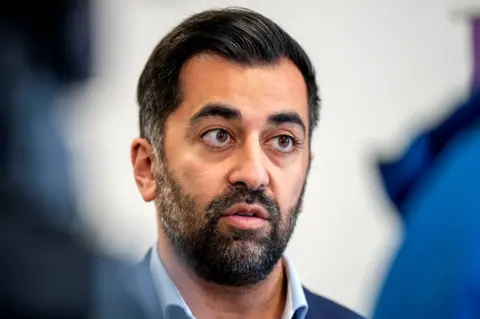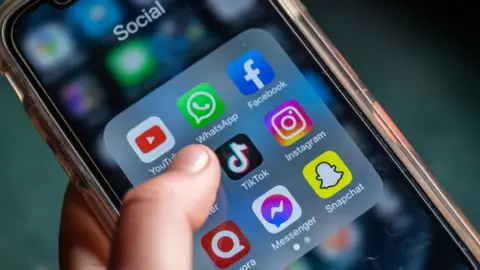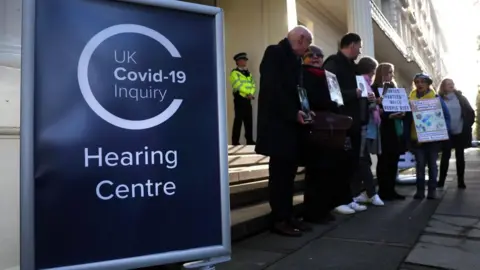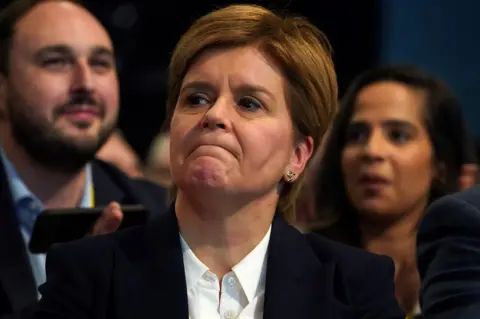Why first minister Humza Yousaf has a Covid transparency problem
 PA Media
PA MediaScotland's First Minister Humza Yousaf has a Covid transparency problem.
Not personally, perhaps. He has after all made clear that he kept all his WhatsApp messages from the pandemic period and is handing them over to the UK public inquiry.
His problem is corporate. He is leading a government that appears to have record-keeping policies and practices that do not meet the needs of the official inquiries into the worst pandemic for a century.
Why do I say that when the Scottish government tells us it is "co-operating fully" with both the UK and Scottish inquiries and providing any requested material that it holds?
Because we already know from the UK inquiry that it believes much of the informal messaging it seeks from Scottish decision-makers has not been retained.
That is a source of frustration to the inquiry's counsel, Jamie Dawson KC, who said last week that "the detail required to understand the full picture has not yet been forthcoming".
I have also taken time to read what the Scottish government points to as the relevant policy and guidance, although the current versions were not in place when the first Covid-19 case was confirmed in Scotland.
It seems to me there is a tension at the heart of the Scottish government's approach.
It wants stuff kept for the official record and at the same time wants stuff deleted for data security reasons.
There is obvious potential for conflict between these two objectives. What to keep and what to throw away?
When it comes to WhatsApps and other informal communications, the Scottish government's mobile messaging policy (November 2021) tries to square the circle.
It suggests that at least once a month conversations related to government business should be deleted.
 Getty Images
Getty ImagesHowever, it also makes clear that before anything is wiped "salient points of any business discussions and/or decisions" should be transcribed and saved in the official record system.
Sounds fine in principle. In practice, that leaves a fair amount of room for individual discretion. For instance, what is salient and what is not?
To help guide these decisions, the Scottish government's records management policy (February 2021) defines a record as something "which can provide evidence of activities, transactions and decisions made for, or on behalf of, the organisation".
It says the purpose of these records "is to provide reliable evidence of, and information about, 'who, what, when, and why' something happened".
It makes clear these records should be kept as long as necessary to fulfil the Scottish government's business and legal obligations.
This is crucial in the context of the pandemic inquiries.
 EPA
EPAThe UK inquiry seems to want to see all the Covid discussions of some 70 Scottish ministers and officials, so that it can decide what may be relevant.
That is obviously not going to be possible if these communications have already been sifted by their authors in line with Scottish government guidance.
Perhaps it is fortunate from the point of view of the inquiry that not everybody seems to have interpreted and applied this guidance in the same way.
Humza Yousaf, who served as justice and then health secretary during the pandemic, is not the only senior minister to have retained his WhatsApps.
The finance secretary during the global health crisis, Kate Forbes, seems to have taken a similar approach and her cabinet colleague Michael Matheson has told the BBC he kept his WhatsApps too.
 PA Media
PA MediaThat makes it awkward for others who may have been more assiduous in retaining only what they considered necessary for the public record and deleting everything else.
The former first minister, Nicola Sturgeon, and her deputy, John Swinney, have declined to say what they have and have not kept - arguing that public clarification would disrespect the inquiry.
Ms Sturgeon has said that she did not run the pandemic response by WhatsApp and was not a member of any group chats.
That does not exclude the possibility that she used WhatsApp for one-to-one discussions or made use of other informal messaging systems.
She insists her record keeping was in line with Scottish government requirements.
There is particular pressure on her because, as the key Covid decision maker in Scotland, Ms Sturgeon publicly promised in August 2021 that nothing - including WhatsApps and private emails - would be off limits to the inquiries.
When I asked her directly on Tuesday if she stood by that promise, she said that the inquiry would have "full transparency" from her.
Ms Sturgeon did not explain how that could be possible if any material has been deleted.
The UK inquiry has now issued a formal order giving the Scottish government the legal cover it said was necessary for it to release 14,000 (mainly WhatsApp) messages.
It remains to be seen how revealing or otherwise that substantial data dump will be.
It is certainly possible that Scottish government communications are far less colourful and coruscating than some of those that have emerged from the UK government.
If that turns out to be the case, we may be left wondering if that is simply because there was a very different operational culture in Edinburgh or partly because the Scottish system enables a degree of self-censorship.
